Upstanders: How Ethan Itzkow, Serena Ryen, and Hayley Hogan Of Schmeh Films Are Standing Up Against Antisemitism, Racism, Bigotry, and Hate
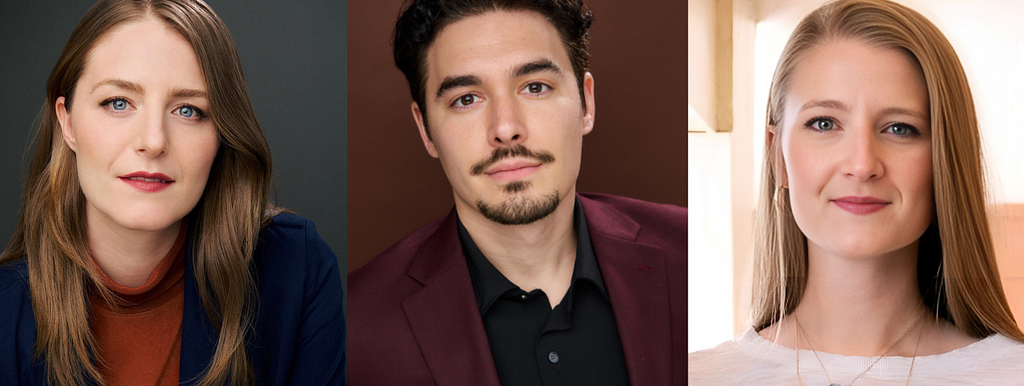
…You need to love the process. The goal isn’t just the outcome, it’s about living a creative life. For instance, if you want to make a movie with a social message, that’s great. But you also need to live and breathe your art to make that happen. It’s not just about working hard and fast, it’s about creating a world around you and embracing the lifestyle of an artist to sustain yourself throughout the process. Especially in the case of making something like HIGH SCORE, sustaining the inspiration, curiosity, and the actual love for making art is critical. This is especially true for telling stories with deep and dark themes…
I had the pleasure of talking with Ethan Itzkow, Serena Ryen, and Hayley Hogan.
Ethan Itzkow is a multi-talented artist in the film industry, known for his work both in front of and behind the camera. Co-founder of Schmeh Films alongside Serena Ryen and Hayley Hogan, Ethan has contributed significantly to creating thought-provoking and socially impactful cinema. His expertise encompasses writing, directing, and acting, showcasing a versatile skill set in the realm of storytelling.
Ethan’s acting prowess is notably recognized in the Netflix series “You.” In his directorial ventures, he has successfully merged artistic integrity with commercial viability, as seen in his film “High Score,” which won accolades such as Best Short Film, Best Actor, a Stop Hate Award, and others at various film festivals, including the Chelsea Film Festival and the Immigration Film Festival.
“High Score,” co-written and directed by Ethan and Serena Ryen, is a compelling narrative that delves into the dark world of online radicalization and its impact on society. This film stands as a testament to Ethan’s commitment to addressing complex social issues through the medium of cinema. It highlights the dangers of extremist ideologies and misinformation in the digital age, resonating with global audiences for its timely and critical message.
Ethan’s collaboration with Serena Ryen has been fruitful, with their first joint project “CASHED” achieving multiple accolades, including Best Dramatic Short and Best Cinematography. This success is a reflection of their shared vision and passion for crafting stories that challenge perceptions and evoke emotional responses.
In addition to his achievements in film, Ethan is represented by notable agencies such as Hanns Wolters International, Stefanie Talent & Entertainment, and Lon Haber & Co | IPPR.
Overall, Ethan Itzkow is a dynamic and influential figure in contemporary cinema, dedicated to producing content that not only entertains but also enlightens and inspires change. His work continues to push the boundaries of conventional storytelling, making him a significant voice in the world of film and media.
Serena Ryen is a talented filmmaker and actress, co-founder of Schmeh Films along with Ethan Itzkow and Hayley Hogan. Known for their dedication to creating mind-bending, purpose-driven entertainment, Ryen and Itzkow have garnered acclaim for their work, including the award-winning film “CASHED,” now streaming on Prime Video.
Their latest project, “High Score,” directed and written by both Ryen and Itzkow, is an innovative film that tackles the horror of racism in a gripping narrative. This film, which had its world premiere on January 6, 2024, via Film Shortage, stars Ethan Itzkow and has been highlighted for its ability to address social issues powerfully and effectively.
Ryen’s artistic vision is evident in “High Score,” a film that delves into the dangers of online radicalization and the spread of hate speech. The story follows a young white supremacist who becomes immersed in extremist ideologies, showing the real-life consequences of misinformation and hate speech in the digital era.
“High Score” has received numerous accolades, including Best Short Film and Best Actor for Ethan Itzkow at the Chelsea Film Festival, and a Stop Hate Award at the Immigration Film Festival. The film also won Best Thriller Short at the Culver City Film Fest and was nominated for Best Short Film at the Orlando Film Fest.
Ryen’s first collaboration with Itzkow, “CASHED,” has won multiple awards, including Best Dramatic Short, Best Cinematography and Best Actress for Ryen. Ryen has been further recognized for her acting prowess, having performed opposite household-name actors and on prestigious stages such as Carnegie Hall and the Tony Award-winning Cincinnati Playhouse in the Park. Her collaboration on “Jade” with Dirty Coffee Pictures, starring Apple TV’s Luke Tennie and THE KILL ROOM’s Noam Shapiro, won Tennie Best Actor at the Chelsea Film Festival.
Ryen is represented by Dream Maker Talent Management, Stefanie Talent & Entertainment, and Lon Haber & Co | IPPR. Her commitment to storytelling that fosters empathy, addresses social issues, and offers a unique perspective on the human experience continues to impact audiences worldwide.
Hayley Hogan, alongside Serena Ryen and Ethan Itzkow, co-founded Schmeh Films, a company known for its impactful storytelling and dedication to changing the film industry’s working culture. Hogan, with a BFA in Photography from the School of Visual Arts, has a rich background in visual arts and design. Her early career saw her working on sets with icons like Beyoncé and Blake Griffin, producing award-winning content with international agencies, and developing projects for global titans like Hershey’s, Baileys, and Mozilla.
At Schmeh Films, Hogan, alongside Ryen and Itzkow, aims to create content that scratches at the underbelly of the human condition. Their award-winning movie “CASHED,” now streaming on Prime Video, is a testament to their vision, having won accolades for Audience Choice, Best Dramatic Short, Best Actress, and Best Cinematography, along with a nomination for Best Short Comedy. Their film “High Score” addresses the pressing issue of white supremacy in the digital age and has earned multiple awards, including Best Short, Best Actor, and Best Thriller.
Hogan is not just a filmmaker but also a strong advocate for women in leadership roles. She believes empowering women and changing the narrative around female founders are essential steps towards a more equitable industry. She emphasizes the importance of representation and the support of women by women as key to overcoming these challenges.
As a founder, Hogan values versatile skill sets and adaptability, qualities she believes are crucial for successful entrepreneurship. She advocates for maintaining balance, understanding one’s industry thoroughly, and dedicating oneself to living creatively.
Yitzi: It’s a delight and honor to meet you, and it’s good to see Hayley and Serena again as well. Before we dive in, our readers would love to learn about your personal origin story, Ethan. Can you share with us the story of your childhood and how you grew up?
Ethan: Oh, wow. So, I grew up just outside of Chicago on the north side, not too far away from Skokie. I didn’t grow up in an artistic household. Both of my parents were involved in various areas of law. Without getting too into the specifics, the home life wasn’t great. So I really delved into stories, art, and theater as a way of spending less time at home and as a way of processing my immediate surroundings in a way that brought a little bit of joy and sanity. I really identified with Harry Potter under the stairs when those books came out and I went really hard into the optimism of Star Trek: The Next Generation. I started writing short stories as a kid. Eventually, that blossomed into a love of theater, which I encountered at the very end of middle school and continued all through high school. And that brought me all the way here, acting in New York, making films, directing, writing. I originally wanted to be a writer, hence the short story writing when I was a kid, before going into performance, and now I’ve come all the way back around.
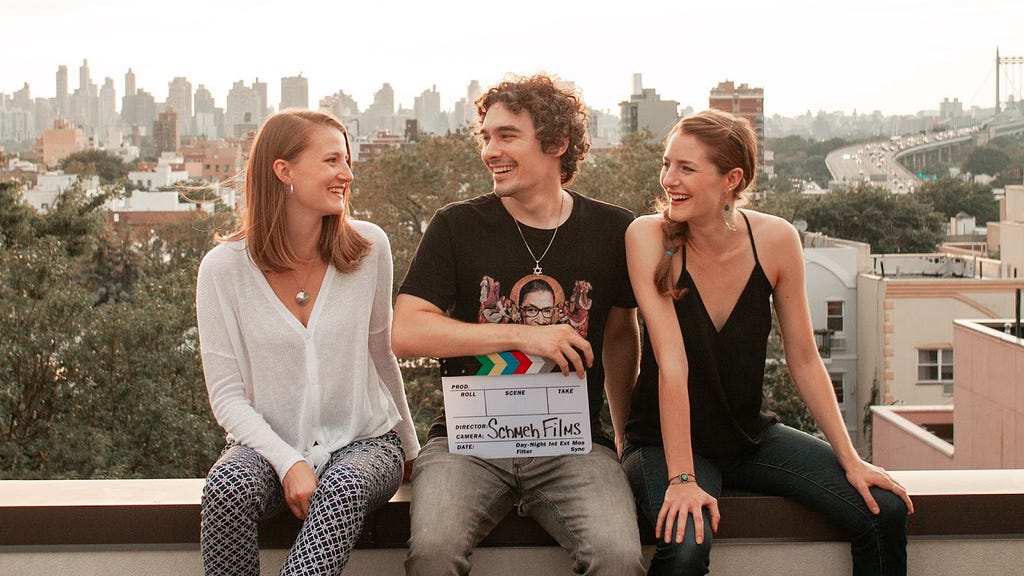
Yitzi: So, Hayley, can you share with us a story of what first brought you to the entertainment industry?
Hayley: Well, in case you can’t tell, Serena and I are related. We’re sisters. We have the same face. And I would say we grew up in a pretty creative household. Our mom was, and still is, an avid reader. So I think the foundation of our love of storytelling starts there. Like Ethan, we read a lot of Harry Potter, Lord of the Rings, Stephen King. I think I read Misery when I was like 11, which was way too young. And our dad was a musician. So for his whole life, he was playing music and desperately trying to get us to play the guitar. We really grew up around art and entertainment, going to James Taylor concerts, and I would say to this day, our love language as a family is TV and movies. As kids, we would gather around as a family and watch every episode of 24 or Lost. All the kids in the neighborhood would come over and watch Glee at our house. That love of stories has followed us through the ages. I actually took a detour on my way to filmmaking and spent several years as a photographer and working in design. So I’ve always been in visual arts, and it comes in handy all the time — I designed the poster for High Score myself. The entertainment industry lets me blend together all these eclectic skills and interests in the best way.
Yitzi: That’s beautiful. So Serena, you probably have so many fascinating experiences in the various parts of your career. Can you share with us one of your favorite anecdotes from your filmmaking and film-producing career?
Serena: Oh, yeah. One of the most enriching experiences so far — and there are so many — was when I shot an episode of one of my favorite TV shows opposite two incredible A-list actresses right before the SAG strikes started. I’m NDA-ed until it airs, but you’d know them instantly. I had prepared like crazy and was beyond excited because I’d devoured the first season of this series, and I admired the master actors I knew I’d be working with. But I was so nervous, and the star of the show was so transformed for her role, that I didn’t even recognize her when I walked into the Hair & Makeup trailer and looked straight at her. She graciously came over to introduce herself to me and later on set, she invited me to run lines together during setup. After we’d rehearsed the scene, I walked away as per my blocking and heard her say to her co-star “Wow, she’s great.” I’ll never forget that moment! We did what felt like (and maybe actually was) a dozen takes of the scene, and after we wrapped, both of these mind-blowing movie stars ran up to hug me. To say I was over the moon would be an understatement. I learned so much from watching them work up close, and their grace and inviting demeanors were a welcome reminder that even when you’re Academy Award-nominated, kindness, warmth, and generosity of spirit go a long way.
Yitzi: So, Ethan, Serena mentioned your film High Score. Can you tell us a bit about what High Score is about and why our readers should make sure to see it, including its premise and its lesson?
Ethan: Yeah. HIGH SCORE follows a burgeoning white supremacist as he descends deeper into the abyss of online radicalization and extremist conspiracy theories. People should see it because it reflects what’s happening in our society. We based the main character on an archetype of many mass shooters who’ve committed acts of violence in the US and around the world, influenced by the Great Replacement Conspiracy Theory. When we made the film, almost no one knew what it was. It wasn’t in the public consciousness unless you were an FBI agent or a member of the ADL Center for Extremism. Now that people have a greater understanding of it, the film is even more relevant. It details an average person’s descent into extremist conspiracy theories online through social media and other media outlets.
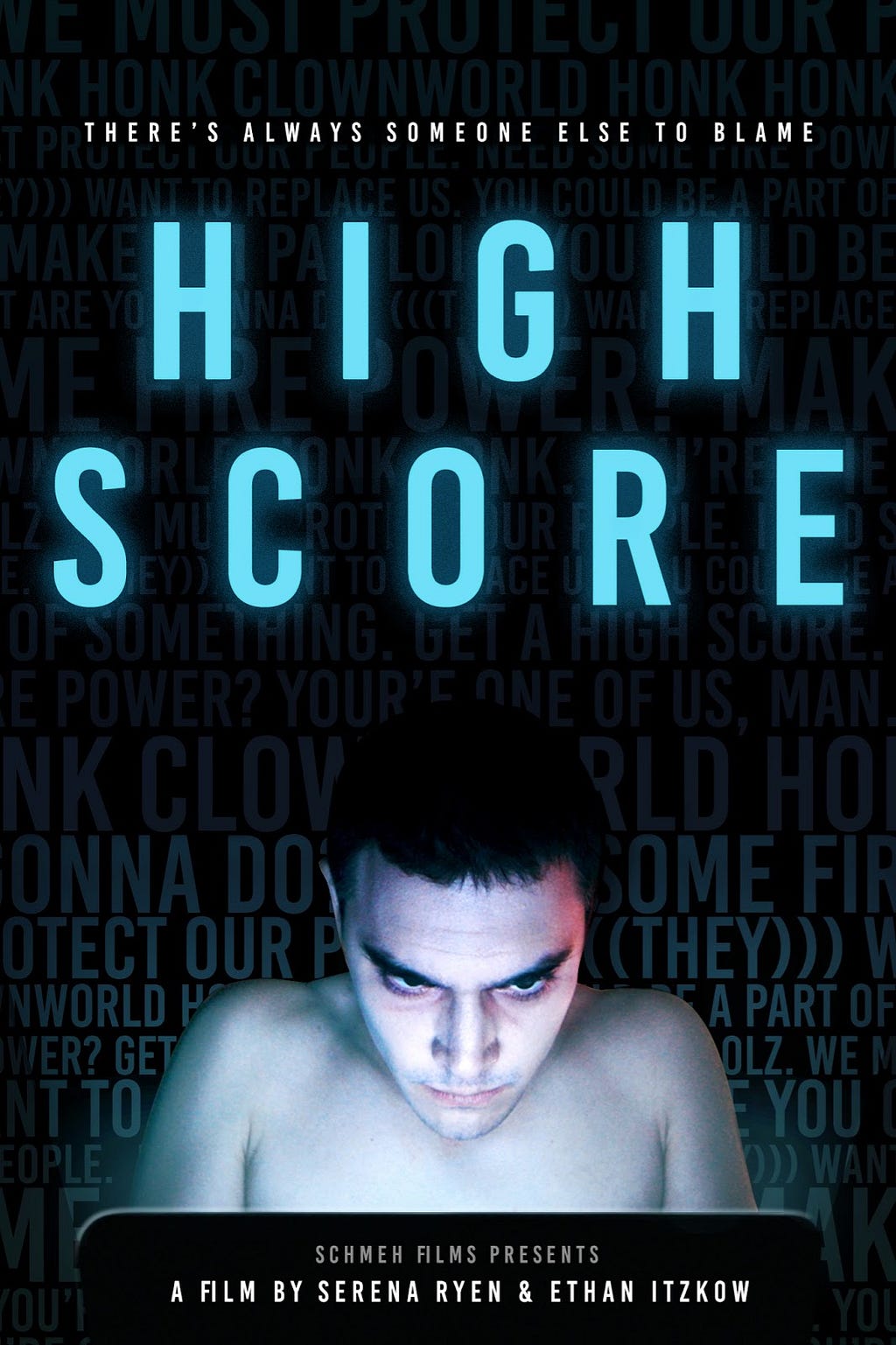
The reason we made the film was, unfortunately, due to two synagogue shootings: the Pittsburgh massacre in 2018 and the Poway Synagogue shooting in 2019. Both were driven by the Great Replacement Conspiracy Theory. Serena and I were touring internationally as actors during these events, and we felt powerless to help. We were in Los Angeles for a screening of our other film, CASHED, when the Poway Synagogue shooting happened. It was six months to the day after the Pittsburgh shooting, and both shooters had left a trail of racist, antisemitic, and misogynist content on their social media feeds. This pattern is seen in many shootings, like those in Buffalo, El Paso, and Christchurch, where early detection of social media breadcrumbs could have potentially prevented these acts of violence.
After winning the Audience Choice Award at a festival in Los Angeles, which came with a camera package prize, we felt compelled to do something. So we embarked on a journey of deep research, wrote the film, and aimed to inform people through the power of storytelling and entertainment about what’s really going on in our national and online discourse. Given the explosive events happening globally and how they translate from social media to real-world violence, it’s crucial to examine how we consume media online and its influence on us. We need to ask ourselves if we’re in an echo chamber, if we’re independently verifying sources, or if we’re letting memes influence our beliefs. And that’s really what HIGH SCORE is about.
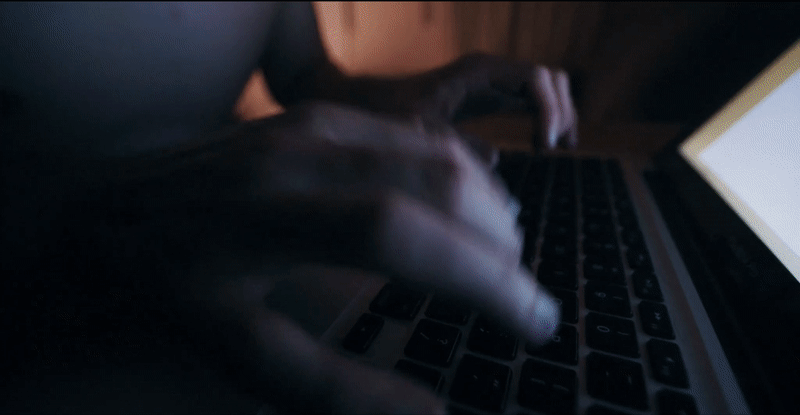
Yitzi: So, Serena, when you made this film, was your main goal the message, or was it the entertainment value, and then by swallowing the spoonful of sugar, they’ll eat the medicine?
Serena: That’s a great question, Yitzi. When we initially set out to write this movie, we thought we were going to write a dark comedy. When we won that award with CASHED, I remember being in a hotel in Argentina on tour, and I asked Ethan, “What do you want to do with this camera package prize?” He said he wanted to make a movie about hate. Initially, we thought we would approach it with some dark, sick humor, as the subject is so horrifying and tragic. But as we started to write, we couldn’t find that humorous angle. There was nothing about it that seemed to want to be told in that way. So it started from a spoonful of sugar mentality, thinking maybe if we make it over the top, we can examine this harsh reality in a digestible way. But as we built it, it came more and more from a need to understand what could drive a person to commit these acts. Not to make excuses for their behavior, but to try to get at it from the inside. Through deep, disturbing research, the film revealed itself as a piece that could shine a light on this terrifying reality and, for lack of a better word, educate people on people become indoctrinated to these ideas in real-time. The message, if there is one, emerged naturally.
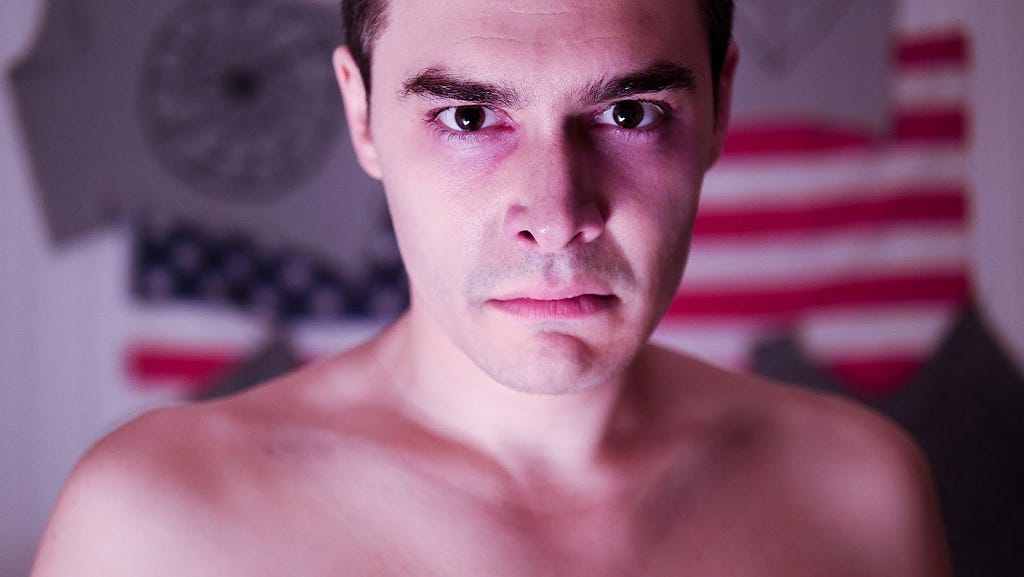
Yitzi: So, Hayley, let’s talk for a minute about the core of the premise and the message of the film. You’re deeply familiar with it, knowing all the ins and outs. How would you rebut the Great Replacement conspiracy theory?
Hayley: The first thing to acknowledge is that it all comes from a place of fear. The people who are promoting The Great Replacement theory are terrified, and they convey that through fear-mongering. It’s this mindset of misery loves company, like let’s all get together and hate something. But as far as rebutting it goes, especially as an American, it’s completely nonsensical. This country has always been a melting pot, we grow up learning that in the U.S. So it’s illogical to look around at what generations of diverse people have built together and now decide that we’re under threat and need to send people “home.” Granted, this isn’t new, this conspiracy theory and others have been around for all of history. But especially when those types of arguments come from people who are descendants of immigrants, which most of us are, it negates the reality that we’re all after the same thing. We’re all just trying to do our best to live and survive. We spend a lot of energy on hate that could be spent on bolstering ourselves and our communities.
Yitzi: Conservative pundit Ann Coulter has written that that immigrants coming from third-world countries bring their “bad” culture into our country, transforming it into those very “hellholes.” How would you respond to that?
Ethan: It’s challenging to address such a claim, especially when it’s based on bigotry and flawed logic. Many people fleeing to the United States from places like Guatemala and Ecuador are escaping situations that we, the United States, have significantly contributed to through our military and political interventions. History, not conspiracy theories, has shown our role in overthrowing governments, leading to destabilization in these countries. Those seeking refuge are not bringing an “inferior” culture, as claimed. They’re enriching the ever-changing, expansive culture we have here in The States. This idea is a manifestation of white supremacy. The notion of a superior Western white American culture is nonsense, it’s racism. A singular culture doesn’t exist here. Rather, the U.S. itself is a mosaic of dozens, if not hundreds, of subcultures.
When we examine various statistics about the United States, be it infant mortality, life expectancy, or murder rates, it’s startling. It’s almost unbelievable that Israel, despite being in an active war zone, has fewer per capita deaths from murder than the U.S., where mass shootings occur frequently. Issues like child poverty and homelessness are rampant here. We have plenty to work on here without blaming immigrant communities for our problems.
Furthermore, the terminology of “first world” and “third world” is outdated, harking back to the Cold War era. If we continue to use such a mindset, we’re essentially halting our progress.
Yitzi: OK, that’s great. So one final question on this somber topic. Serena, it sounds like the unspoken part of this whole conversation is that Jews are the boogeymen of this story. The conspiracy suggests that Jews are secretly orchestrating the Great Replacement theory. How do we rebut that? How do we explain to the world that we, as Jews, have never been involved in such meetings?
Serena: It’s lunacy and nothing more than scapegoating. Hayley mentioned that it stems from a place of fear, from a distorted perception that has no basis in reality. I remember an incident during a rehearsal for a project we were working on years ago. An actor commented that Hollywood is run by Jews, and this actor just wanted to be hired by the Jewish people “pulling all the strings.” We paused the rehearsal for a history lesson. I think I said, “If that were true, why is my Jewish husband here in this tiny rehearsal room right now?” It’s absurd. Just look at Mel Gibson’s career; the fact that he’s still working after repeated incidents of unabashed antisemitism is proof that Jews don’t control the media. If they did, he wouldn’t have a career.
The truth is that the Jewish people have faced persecution relentlessly throughout history. As a whole, they’ve shown incredible resilience, constantly moving and trying to survive, often thriving despite the hardships. Of course, that doesn’t mean every Jewish person’s experience is the same; I don’t mean it as an overarching stereotype. A quick rebuttal to the conspiracy theory is considering the numbers: Jews are only two percent of the U.S. population and 0.2 percent globally. If Jewish people had such superhuman abilities and secretly controlled the world, tragedies like the Holocaust, the Chmielnicki Massacre in the 1700s, and the Hadrian genocide wouldn’t have occurred. There have been too many massacres of Jewish people for this theory of control to hold any water. It’s age-old scapegoating by dissatisfied people who desperately need to blame someone for their own stagnation.
Yitzi: So this is the centerpiece question we ask in all of our interviews. You’re all working on a project that’s making a social impact. Can you share five things you need to create a film that has a positive social impact?
- Hayley: OK, the first one, and I believe this applies to making anything really, but particularly a film with social impact, is that you need to love the process. The goal isn’t just the outcome, it’s about living a creative life. For instance, if you want to make a movie with a social message, that’s great. But you also need to live and breathe your art to make that happen. It’s not just about working hard and fast, it’s about creating a world around you and embracing the lifestyle of an artist to sustain yourself throughout the process. Especially in the case of making something like HIGH SCORE, sustaining the inspiration, curiosity, and the actual love for making art is critical. This is especially true for telling stories with deep and dark themes.
- Serena: What comes to mind for me is the need to create what must come out of you. Often, this stems from what troubles you. Consider what disturbs you about the world, what keeps you up at night, or what continuously gnaws at the back of your mind. Think about what you can’t seem to wrap your head around or what you wish was different in the world. Start from there and see where that takes you.
- Ethan: What I want to emphasize is not to be afraid of exploring the darker parts of yourself. In my case, I’m Jewish and have faced antisemitism. However, I also grew up around many racist ideas, some of which I believed and incorporated into the film. I included them, especially casual racist beliefs I held because adults around me instilled them during my childhood. I wanted viewers to recognize these beliefs in the early scenes and then follow the character’s arc, realizing that what seems like a harmless joke or an innocuous comment can have the same roots as the actions of deeply racist individuals. This required a lot of self-examination and, frankly, courage to acknowledge and reject these past beliefs. It’s a continuous learning process, but I wanted to show that these beliefs are flawed and encourage others to reflect on themselves. I believe that everyone, regardless of their background, needs to introspect and address their darker aspects. To create art that truly resonates, you can’t shy away from these truths. There’s no shame in it. In fact, it’s a beautiful thing to have enough self-awareness to recognize and adjust narrow-mindedness, setting aside one’s ego in the process.
- Hayley: You also have to get comfortable with being uncomfortable, especially in filmmaking and when telling social stories. You have to be willing to try new things, potentially making mistakes in front of many people, and instigating disagreements. Embracing the discomfort that comes with being an artist and putting your work out there is essential. Particularly with projects like HIGH SCORE, uncomfortable conversations are bound to arise. And you can learn to be at ease with that. It’s part of the process. So, finding a way to stay centered and mindful is key to being okay with those itchy feelings.
- Serena: The last point I want to add is about HIGH SCORE, which is a social thriller. It’s undeniably dark, but when creating something with social impact, it’s important to remember that not everything has to be so intense. Even in a heavy piece, it’s valuable to find moments to let the air out. Although HIGH SCORE is intense, we deliberately included moments to let it breathe, injecting some over-the-top visuals or a bit of absurd, sick humor. You can also take a piece like The Barbie Movie, which makes a profound social impact but isn’t heavy. It’s about finding both sides of the coin. If something becomes too preachy, it loses its audience. Whether it’s a comedy or a drama, there’s always room for moments that offer emotional balance.
Yitzi: Yeah, that’s the final question. So, Ethan, how can our readers watch the film? How can they support your overall efforts? How can they continue to follow your work?
Ethan: Absolutely. You can watch HIGH SCORE now, streaming on Film Shortage — both on their website, which is filmshortage.com and on their YouTube channel. All you have to do is go to YouTube and search “High Score Film Shortage.” You can also watch CASHED on Amazon Prime Video, and you can check out more of our work at www.schmehfilms.com. Follow HIGH SCORE on Instagram @highscore_film, and follow Schmeh Films on Instagram and X (Twitter) @SchmehFilms or on TikTok @schmeh.films.
HIGH SCORE won many awards during its festival run like Best Short Film, Best Thriller Short, two Best Actor Awards, and a Stop Hate Award. It was also nominated for another Best Short award and screened at Oscar Qualifying and Canadian Screen Award Qualifying festivals like HollyShort and the Female Eye.
Yitzi: Okay. This has been such a joy to meet you. I feel so blessed that we’re connected and could talk for another hour. I hope we can do this again. I’m excited to share this with our readers.
Thank you so much. You’re such a wonderful guy. This was great.
Upstanders: How Ethan Itzkow, Serena Ryen, and Hayley Hogan Of Schmeh Films Are Standing Up Against… was originally published in Authority Magazine on Medium, where people are continuing the conversation by highlighting and responding to this story.
